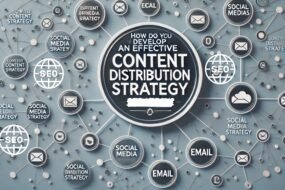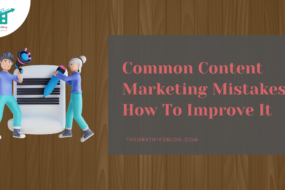
In the continually changing and dynamic realm of digital marketing, businesses constantly seek effective strategies to establish a connection with their intended audience and enhance sales. Content marketing has emerged as a game-changing approach that engages customers and drives sales robustly and sustainably. This blog post will explore the depths of the fascinating realm of content marketing and how content marketing drives sales and can drive increased revenue and business growth.
Content marketing goes beyond being a mere buzzword; it is a strategic method that leverages providing valuable, pertinent, and consistent content to attract, engage, and convert potential customers. The right approach can revolutionize your business by building trust, nurturing relationships, and ultimately leading to sales. We’ll walk you through the key elements that make content marketing indispensable in the modern marketer’s toolkit and demonstrate how it can significantly impact your bottom line.
What Is Content Marketing?
Content marketing is a strategic approach that generates and disseminates valuable, relevant, and consistent content to attract and engage a target audience. Content marketing aims to establish trust, educate, inform, and entertain the audience, seeking to drive profitable customer actions, such as increasing brand awareness, generating leads, and ultimately driving sales. Content marketing emphasizes delivering content that provides value to the audience rather than directly promoting products or services.
How Content Marketing Drives Sales
Content marketing and sales are closely interconnected and play a significant role in the success of a business. Content marketing involves strategically producing and disseminating valuable, pertinent, consistent content to attract and engage a target. The overarching goal of content marketing is to stimulate profitable customer actions by engaging with the audience. Actions, and one of the most essential actions is making a sale. Here’s how content marketing and sales are connected:
- Lead Generation: Content marketing is an effective tool for generating leads. Creating high-quality, informative content can attract potential customers to your website or other online platforms. By offering content that addresses their needs and interests, you can capture their contact information and transform them into potential leads for your sales team.
- Education and Information: Content marketing is a means to educate and inform your target audience. By providing valuable information, you can assist prospective customers in comprehending the advantages of your products or services. This education can influence their decision-making process, making it more likely for them to buy from you.
- Building Trust and Credibility: Content that is well-researched and demonstrates expertise helps build trust and credibility with your audience. When potential customers trust your brand and perceive you as an authority in your industry, they are more likely to purchase. Trust plays a vital role in the sales process.
- Lead Nurturing: Content can be used to nurture leads at various sales funnel stages. Multiple forms of content can be customized for specific stages of the buyer’s journey, helping move prospects closer to purchasing. For example, blog posts may attract awareness-stage leads, while case studies or product demos could be used for consideration- or decision-stage leads.
- Addressing Objections: Content marketing can address common objections and concerns potential customers may have about your products or services. By providing information that alleviates these objections, enhancing the probability of securing a sale is achievable.
- Personalization: With data-driven content strategies, you can personalize content for individual leads or segments of your audience. Personalization makes the content more likely to resonate with the reader, increasing the chances of making a sale.
- SEO and Visibility: Content marketing improves your website’s search engine visibility. When your content ranks well in search results, it can attract more organic traffic, including Prospective customers seeking similar products or services.
- Lead Scoring and Qualification: The content engagement of leads can be used as a signal for lead scoring and qualification. Leads who engage with your content and spend time on your website may be more qualified and further along in their buying journey.
- Content-Supported Sales Materials: Content can also be part of your sales materials. For example, whitepapers, eBooks, or case studies can be provided to sales teams to share with prospects during the sales process, adding value and providing insights that can lead to a sale.
- Analytics and Data Insights: Content marketing can provide valuable data and insights about your audience’s behavior and preferences. This data can inform your sales strategies and help you better understand your customers.
Importance Of High-Quality Content
Here are several vital reasons why high-quality content is essential for sales success:
- Content attracts and engages potential customers.
- It educates and informs, aiding decision-making.
- Quality content builds trust and credibility.
- Addresses customer pain points and needs.
- Guides lead through the sales process.
- Boosts search engine rankings for organic traffic.
- Showcases product or service benefits.
- Demonstrates value through success stories.
- Personalization caters to different customer segments.
- Establishes industry authority and thought leadership.
- Shareable content can increase brand visibility.
- Fosters repeat business and customer loyalty.
Examples Of High-Quality Content

High-quality content varies depending on the context and the target audience, but here are some examples across different formats and industries:
- In-Depth Guides and Tutorials: Comprehensive, well-researched guides and tutorials that thoroughly explain a complex topic or process can be considered high-quality content. For example, a step-by-step guide to setting up a home network
- Case Studies: Presenting detailed case studies showcasing real-world success stories offers valuable evidence of your product or service’s effectiveness. These studies illustrate how your offerings positively impact customers, providing tangible proof of their value.
- Video Webinars or Masterclasses: Delivering in-depth insights, tips, and solutions through video webinars or masterclasses constitutes high-quality content. These formats cover a range of topics, from digital marketing to cooking techniques, providing valuable and engaging content for the audience.
- Data-Driven Research and Reports: Leveraging data-driven research and reports, such as original studies or analyses, can bolster authority and offer valuable insights. An example is an annual industry trends report, demonstrating a commitment to providing relevant and authoritative information.
- Interviews with Experts: Engaging in interviews with industry experts provides valuable perspectives and insights. This can take the form of podcasts or video interviews featuring thought leaders, showcasing a commitment to delivering expert viewpoints and enhancing content credibility.
- Infographics: High-quality content includes well-crafted infographics, visually simplifying complex information in an engaging manner. Infographics are particularly effective for summarizing statistics or data, offering a visually compelling way to convey intricate details.
The Importance Of Sales In Business

Sales are the lifeblood of any business. They involve the process of convincing potential customers to purchase a product or service, leading to revenue generation and business growth. Sales are vital for several reasons:
- Revenue Generation: Sales play a pivotal role in a company’s revenue generation, facilitating the coverage of expenses, investment in growth initiatives, and the generation of profits.
- Business Growth: Successful sales efforts are essential for business expansion, whether through increasing market share, entering new markets, or launching new products.
- Customer Acquisition: Acquiring new customers through sales is essential for sustaining and expanding a business. It serves as a vital mechanism for business growth and long-term sustainability.
- Customer Retention: Maintaining and growing relationships with retaining current customers is frequently more cost-effective than acquiring new ones and making sales critical for customer retention and repeat business.
- Market Competitiveness: Effective sales strategies help businesses stay competitive by capturing market share and responding to changing customer demands.
- Innovation and Improvement: Customer feedback gathered during the sales process can lead to product or service improvements and innovations, ensuring continued relevance.
- Economic Impact: Sales activities have broader financial implications, contributing to employment, economic growth, and the well-being of a community.
- Funding and Investment: Successful sales can attract investors and funding, supporting business expansion and development.
FAQs
Q1. What Are The Best Practices For Incorporating Calls To Action (CTAs) Into Content To Drive Sales?
CTAs should be clear, relevant, and strategically placed within the content to encourage specific actions, such as purchasing or requesting a quote.
Q2. Which Forms Of Content Are Most Impactful In Promoting Immediate Sales?
Content such as product demonstrations, customer testimonials, and limited-time offers can have a more immediate impact on sales.
Q3. What Role Does SEO Play In Content Marketing’s Impact On Sales?
SEO helps content rank well in search-yielding outcomes, boosting organic traffic and enhancing the likelihood of sales conversions.
Conclusion
Content marketing is a powerful sales driver, providing businesses with the means to attract, engage, educate, and build trust with their target audience. Through well-crafted content, businesses can guide potential customers through the sales funnel, addressing objections, showcasing value, and ultimately influencing buying decisions. If you’d like to learn more about how content marketing drives sales, please visit our blog for further insights and guidance.








No Comments